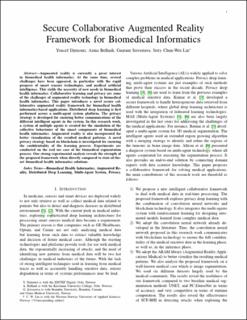Secure Collaborative Augmented Reality Framework for Biomedical Informatics
Peer reviewed, Journal article
Submitted version
Permanent lenke
https://hdl.handle.net/11250/3003113Utgivelsesdato
2021Metadata
Vis full innførselOriginalversjon
IEEE Journal of Biomedical and Health Informatics, 26 (6), 2022, 2417-2424. 10.1109/JBHI.2021.3139575Sammendrag
Augmented reality is currently a great interest in biomedical health informatics. At the same time, several challenges have been appeared, in particular with the rapid progress of smart sensors technologies, and medical artificial intelligence. This yields the necessity of new needs in biomedical health informatics. Collaborative learning and privacy are some of the challenges of augmented reality technology in biomedical health informatics. This paper introduces a novel secure collaborative augmented reality framework for biomedical health informatics-based applications. Distributed deep learning is first performed across a multi-agent system platform. The privacy strategy is developed for ensuring better communications of the different intelligent agents in the system. In this research work, a system of multiple agents is created for the simulation of the collective behaviours of the smart components of biomedical health informatics. Augmented reality is also incorporated for better visualization of the resulted medical patterns. A novel privacy strategy based on blockchain is investigated for ensuring the confidentiality of the learning process. Experiments are conducted on the real use case of the biomedical segmentation process. Our strong experimental analysis reveals the strength of the proposed framework when directly compared to state-of-the-art biomedical health informatics solutions.
